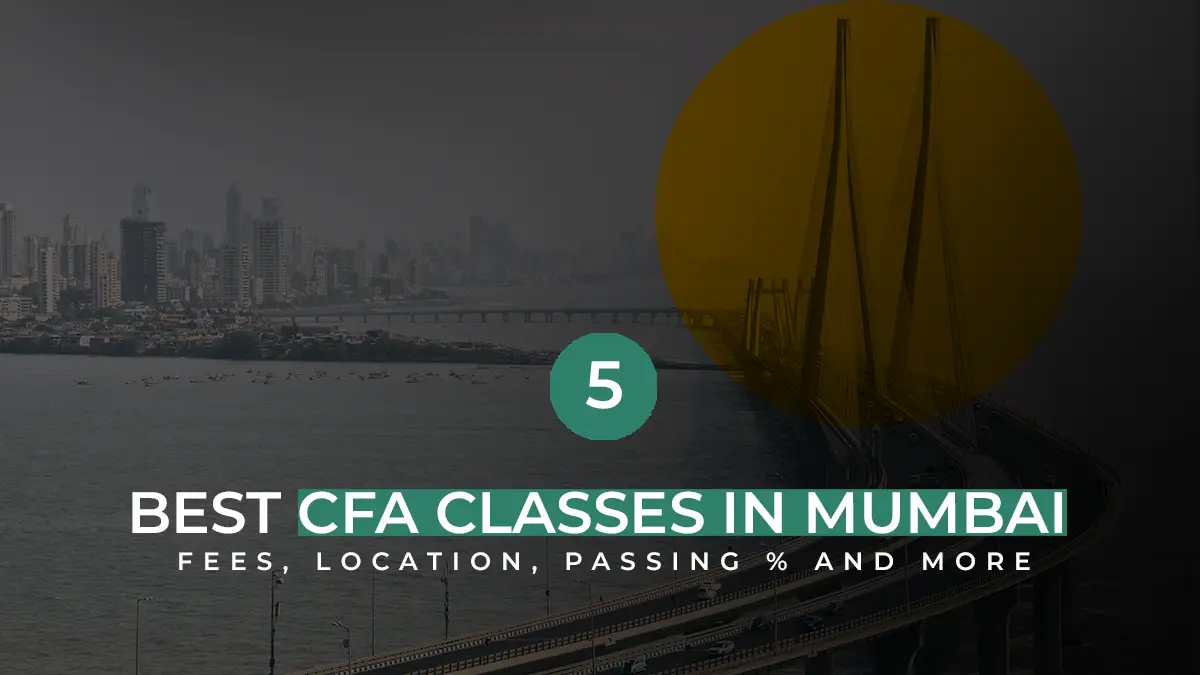All About The CFA Course
What is CFA?
The designation CFA® is deemed to be the gold standard designation in the field of finance and investments. The CFA® course tests the candidates on subjects like economics, accounting, ethics, management, money, and security analysis. This program holds global importance and is accepted as a high-level qualification in almost 165 countries. Started in 1947 by CFA Institute (earlier known as AIMR), this course trains students to become ethical, competent financial analysts.
The CFA® course is a global benchmark for anyone in the field of finance. The completion of this program serves as evidence of your mastery over different financial sectors. The skills and knowledge required to pass this course are essential for success in the financial field. The Chartered Financial Analyst® program is divided into three levels, each of them equally crucial.
| Career Enhancer
Skills learnt from the CFA® course help you get jobs such as portfolio manager, CFO, and Fund manager, Wealth manager, etc., |
Worldwide Recognition
The CFA® course is recognised in 165+ countries as a benchmark qualification in the industry. |
Value for money
If you want a quality financial credential that gives you a great investment return, the CFA® Course should be your choice. |
Why Should You Pursue CFA?
Learn why the CFA course is one of the best careers in Finance
- Global Recognition
With over 70 years of legacy, the CFA course credentials are one of the most well-known and respected investment credentials recognised in more than 165 countries.
- Exposure To a Variety of Roles in Finance
Today, be it Fintech, Foreign Exchange, Alternative Investments, or other offbeat profiles, CFA® charter holders are the most preferred options for employers.
- Better job prospects at top investment firms.
The program teaches financial modelling, portfolio management, and other investment-related areas. Top investment firms give preference to charterholders with this knowledge.
- Equipped for analysis and decision-making
The CFA® course enables students to be adept in decision-making by incorporating reasoning and judgment skills as part of the syllabus.
- Delivers practical, real-world skills
The curriculum is framed in such a manner that it helps you to tackle real-world scenarios effectively.
- Enforces ethical standards
The ethics course accounts for 15% of the overall score on a CFA® Program exam. This reinforces strong principles among CFA® charterholders.
- Networking opportunities for faster career growth:
CFA Societies, are present worldwide and offer access to resources that boost your career prospects. They also increase networking opportunities and chances to land your dream job.
To know more about our CFA® Course
Who Should Pursue The CFA Course?
Fresh graduates
Any fresher who is willing to make a career in the investment finance industry by learning world-class knowledge.
Investment Industry Professional
A candidate who is already working in the investment finance industry, but wants to improve skills and gain better recognition.
Academician
If you are teaching investment finance at a university, this designation will give you the platform for better research, credentials and acceptance.
Skilled Management Professional (MBAs)
An individual who understands management and wishes to build a career in financial management, portfolio management, wealth management and more is also the right audience for a CFA® Program.
Not yet sure?
Details on the CFA Program – According to the New Updates
Students aspiring to get into the investment industry with the right knowledge and skills to build a great career need to look into the CFA program. The entire program aims to help students gain the required skills and knowledge of different fields related to investment analysis.
After completing the course and passing the exams, the students will get the designation of CFA Charter. It’s the CFA institute that administers the exams and bestows the students with this designation.
The exam’s syllabus and structure is built to test the examinee’s skills and understanding of different subjects. The three exam levels students are supposed to take are;
- Level 1 – Knowledge and Comprehension
- Level 2 – Application and Analysis
- Level 3 – Synthesis and Evaluation
Each level has the same subjects but carries a different weightage. Here are the subjects in each level;
- Corporate Finance
- Economics
- Financial Reporting and Analysis
- Quantitative Methods
- Alternative Investments
- Derivatives
- Equity Investments
- Fixed Income
- Portfolio Management and Wealth Planning
CFA Level 1
The Level 1 of the CFA exam happens 4 times a year in the months of February, May, August and November. The students have to attempt 180 multiple-choice questions within five hours. Level 1 has 73 modules, 13 more than the previous curriculum.
The students give two exams in two spans of 2 hours and 15 minutes each on the same day. Rest assured that there is no negative marking in this exam. The questions are bifurcated according to the subjects.
The students are recommended to take the help of the CFA Institute Learning Ecosystem (LES) and take online mock tests. All questions are, by default, based on the International Financial Reporting Standards (IFRS). However, the students should still learn about US GAAP. When the questions are based on US GAAP, they will be mentioned specifically.
Subject Weightage
|
Subject |
Weightage (2023) |
Weightage (2024)* |
| Corporate Issuers | 8 to 12 | 6 to 9 |
| Economics | 8 to 12 | 6 to 9 |
| Financial Statement Analysis | 13 to 17 | 11 to 14 |
| Quantitative Methods | 8 to 12 | 6 to 9 |
| Alternative Investments | 5 to 8 | 7 to 10 |
| Derivatives | 5 to 8 | 5 to 8 |
| Equity Investments | 10 to 12 | 11 to 14 |
| Fixed Income | 10 to 12 | 11 to 14 |
| Portfolio Management and Wealth Planning | 5 to 8 | 8 to 12 |
| Ethical and Professional Standards | 15 to 20 | 15 to 20 |
*Weightage for a few topics in Level are stated to change in 2024.
Changes in Level 1:
There are changes in the subject weightage for the 2024 season. Moreover, the students are expected to have an understanding of Economics, Quantitative Methods, and Financial Statements, before going for the Level 1 exam. The students can still have access to these materials, but they won’t be assessed in the exams.
Three new readings have been added to Level 1;
- Introduction to Geopolitics
- Corporate Structures and Ownership
- Business Models
In the PSM category, the students in Level 1 will also learn about Financial Modeling and Python Programming Fundamentals. IMS Proschool welcomes this inclusion by the CFA Institute as it verifies the necessary changes required to gain practical experience and knowledge.
For the subjects that have been phased out, we believe that they are necessary for a student and provide the required training to every student in those subjects as well. Our motive is to help you sit in the CFA exam with concretized fundamentals, and hence, we have set our training modules accordingly.
Are you currently studying in your second year of the degree program? IMS Proschool has devised a specialised curriculum for CFA aspirants where we focus on the fundamentals, theoretics, and practical learning associated with this exam.
Jobs After Level 1:
- Lead Analyst
- Equity Research Analyst
- ETF Specialist
- Investment Analyst
- Senior Consultant
- Client Portfolio Manager
- Financial Analyst
- Financial Associate
Level 2
Students can only take the second level of the CFA exam thrice a year, in the month of May, August and November. At this level, the students are trained to focus on the application of investment tools with context to real-life situations.
This exam has 22 item sets with a total of 88 MCQs. The examinees will get 4 hours and 24 minutes of time separated into two sessions of equal duration. At its core, this exam helps the students learn to analyse different situations and get into results.
Here too, the students are recommended to take mock tests to get familiar with the exam’s format. Students who have cleared this exam have reported studying for at least 300 hours.
Changes in Level 2:
The students preparing for the Level 2 exam will find changes in the learning modules. There have been some structural changes in the curriculum wherein, new topics have been added, and a few of them have been transferred to Level 1. Out of all, the most notable ones include division of multiple regression content into four learning modules.
In the PSM module, students in Level 2 will gain practical training in Analyst Skills and Python, Data Science, and AI.
Subject Weightage:
|
Subject |
Weightage |
| Corporate Issuers | 5 to 10 |
| Economics | 5 to 10 |
| Financial Statement Analysis | 10 to 15 |
| Quantitative Methods | 5 to 10 |
| Alternative Investments | 5 to 10 |
| Derivatives | 5 to 10 |
| Equity Investments | 10 to 15 |
| Fixed Income | 10 to 15 |
| Portfolio Management and Wealth Planning | 10 to 15 |
| Ethical and Professional Standards | 10 to 15 |
Jobs After Level 2:
- Associate Director
- Real Estate and Real Return Analyst
- Equity Research Analyst
- Senior Analyst
- Investment Analyst
- Investment Management (Vice President Level Post)
- Investment Associate
- Financial Analyst
- Portfolio Manager
- Structured Finance (Credit Analyst)
Level 3
The third level of the CFA exam is taken twice a year in February and August. In this exam, the students are trained to improve their skills on wealth planning and portfolio management. In this exam, the students have to attend 8 to 12 structured essay questions. Plus, there will be 10 multiple-choice questions. All of this must be completed in a time span of 6 hours.
Across the globe, the CFA Charterholders are recognised for their skills and capabilities. This is the exam where everything a student has learned comes together. In this exam, the students have to attempt two types of questions, constructed responses (word-based answers) and calculation-based responses.
The exam is held in two sessions, and in each session, the examinees will get item sets and essay questions. The number of item sets and essay questions will be 5 or 6. It has a vignette form of questions along with MCQs. A word of caution for future exam takers, ensure to be mindful of the time you allocate to the exams in this level.
Subject Weightage:
|
Subject |
Weightage |
| Corporate Issuers | 0 |
| Economics | 5 to 10 |
| Financial Statement Analysis | 0 |
| Quantitative Methods | 0 |
| Alternative Investments | 5 to 10 |
| Derivatives | 5 to 10 |
| Equity Investments | 10 to 15 |
| Fixed Income | 15 to 20 |
| Portfolio Management and Wealth Planning | 35 to 40 |
| Ethical and Professional Standards | 10 to 15 |
Changes in Level 3:
Students need to choose one out of three pathways in Level 3;
- Portfolio Management
- Private Wealth Management
- Private Markets
It will be a significant change, which will come into force in the 2025 season. Other changes for this level include the introduction of PSM, which will also take effect from the 2025 CFA season.
Jobs After Level 3:
You can take up the following jobs if you have completed Level 3, but the Charter certificate is pending.
- Lead Analyst
- Equity Research Analyst
- ETF Specialist
- Associate
- Investment Strategist
- Financial Planner
- Credit Analyst
- Senior Investment Analyst
- Investment Banking Analyst
- Portfolio Strategist
- Manager – Performance and Attribution
- Relationship Management
- Associate Portfolio Manager
How to Become a CFA?
We have talked about the exams that must be completed to become a CFA. For those wondering whether there is something extra they can do to build a better base. To sit in Level 1 of the CFA exam, the students need to have the right credentials.
Students in their second year of their undergraduate degree can start preparing for the CFA Level 1 exam. However, it does not matter which subject the students of the bachelor’s degree. As long as the CFA aspirants have a bachelor’s degree. There is an option to take the Level 1 exam even if the aspirants are in the final year of their bachelor’s.
However, it does make a difference in the proficiency level of the students who have previously studied similar subjects. For those, who don’t want to take the degree route, they need to have relevant work experience. Professionals need at least 4000 hours of work experience before they can sit for the Level 1 exam.
The first two steps of becoming a CFA are getting a degree or work experience. Followed by this, the students are supposed to pass the CFA exams, all three levels. However, the successful candidates won’t receive their Charterholder badge until they have completed the next three steps.
- Work Experience: It is required for a student to gain 48 months of “acceptable work experience.” The students have the freedom to gain this experience either after or before taking the exam. Acceptable work experience is when the aspirant has worked in the areas of trading, economics, and corporate finance. However, note that 50% of this work experience must directly relate to investment decision-making.
- Reference Letter: Reference letters are like pieces of evidence that portray and prove the student’s skills. So to become a CFA charterholder, the student needs to submit reference letters to the CFA Institute. They can submit self-prepared reference letters, but they will carry more value if sourced from supervisors or existing CFA charterholders.
- Fill out the Application: After meeting all the requirements, the candidates must apply to become a CFA charterholder. In addition to filling out the form, the students must also pay the fees. The CFA can take up to 10 days to review all the submitted documents.
For the fees, the students must pay USD299 to become a CFA institute member. This is a yearly membership spanning from the 1st of July to the 30th of June.
CFA Exam Costs
The exam fees for CFA depends on when you opt to join the program. There are two methods of joining;
- Early Registration
- Standard Registration
Early Registration fee for the months of May & August 2024 are $940. The Standard Registration for the same sessions is $1250.
In addition to this, there is a one-time Enrollment Fee to be paid when registering for the Level 1 Exams, which is $350. Students can also reschedule their exam window but at an additional cost of $250.
To Know About CFA Training Fees
Scope of CFA in India and Abroad
CFA is one of the most promising career paths in India and across the globe. CFA Charterholders can take on different kinds of roles, including;
|
Job Role |
Salary in India |
Salary in USA |
| Portfolio Manager | 13 Lakhs/Year | $1,01,000/Year |
| Research Analyst | 5 Lakhs/Year | $5,00,000/Year |
| Risk Manager | 12 Lakhs/Year | $92,215/Year |
| Corporate Financial Analyst | 11 Lakhs/Year | $78,442/Year |
| Investment Banking Analyst | 8 Lakhs/Year | $97,800/Year |
The salary structure of a CFA in the USA can range between $57,000 to as high as $1,00,000 per year. But the exact compensation depends on the company, location, and experience.
As the Indian financial market is on a growth trajectory, investors are looking for people to help them make the right decisions. This reflects in the salary structure offered here, which ranges between 5 Lakhs to 11 Lakhs per year.
Given the scope and these varied job roles, CFA Charterholders also take home a handsome salary. Some of the globally recognised organisations hiring CFAs in India are Tata, Deloitte, SBI Bank, Reliance, and Bharti Airtel, among others.
Interestingly, even the CFA Level 1 pass outs are hired by some companies. The salary structure for these aspirants will be less than the ones who have completed all three levels. But the fact that companies are ready to hire candidates even after passing the Level 1 exam shows the importance of CFA Charterholders. To get a higher salary, the candidates must hone some additional skills. Where analytical skills are primary to becoming a CFA, other important skills are asset valuation, public speaking, and understanding of specific financial calculations.
In the journey to becoming a financial analyst, completing the CFA exams is a huge plus. Becoming a financial analyst without getting the CFA exams is possible, but doing so won’t bring as much financial gain. The reason being the CFA exams are set to test the aspirant’s skills and proficiency.
As a result, when the students complete all three levels of the exam, it shows their competence and capabilities. This is why CFA charterholders attract higher salaries than individuals without this designation.
Are There Any Scholarships for CFA?
CFA Scholarships are available for students who face challenges in sponsoring their exam fees and other costs. To avail of these scholarships, the students must satisfy the eligibility requirements. There are five types of Scholarships available for CFA students;
- Access Scholarships: For anyone who cannot afford the exam fees. Beneficiaries won’t have to pay the CFA program enrolment fees, and the registration fees is reduced to $300.
- Women’s Scholarships: Scholarship for women who have not qualified for any other CFA program scholarship and have not registered for the exam yet. In addition to waiving off the enrollment fee, the exam registration fee is reduced to $400.
- Student Scholarship: This is for students who are studying at an affiliated university. Successful candidates won’t have to pay the enrollment fee, and their exam fee is reduced to $400.
- Professor Scholarship: This is meant for teachers and professors teaching in college or universities To qualify, the candidates must have taught a minimum number of credit hours at qualified institutions. Here too, the beneficiaries enrollment fee is waived off, and the exam registration fee is reduced to $400.
- Regulator Scholarship: This scholarship is for individuals working in institutions including financial regulations, central banks, securities commission, government equities, stock exchanges (qualified), and SROs. For them, too, the enrollment fee is not applicable under the scholarship award, and the exam registration fee is reduced to $400.
Conclusion
Chartered Financial Analyst (CFA) is a prestigious and globally acclaimed examination. Taking the three levels of the CFA exam, the students will train to become proficient financial analysts and gain the necessary knowledge. They use their skills to help individuals and organisations confidently make financial decisions. Passing the CFA exam can be challenging if the student does not have the right guidance.
Get in touch with IMS Proschool to join our CFA course, where we help you learn the skills according to the updated curriculum. We provide 250+ hours of training and 2000 practice questions for each of the CFA levels to help our students build the right skills for the exam.
FAQ’s
Our Blog
Get an insight into the creativity of our team.






